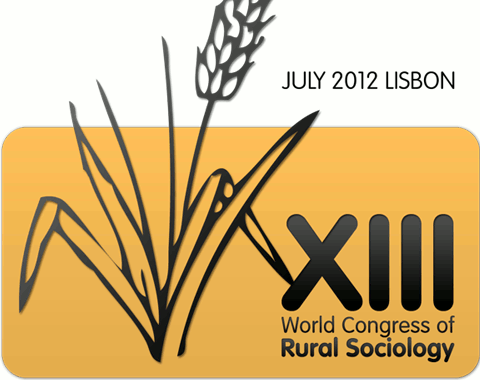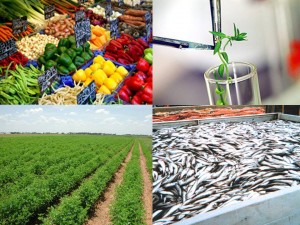 |
Participation of two African researchers to the Biocircle Info Day of 16th of July (second row):
Dr I.Charles Okoli (Tropical Animal Health and Production Research Lab. Department of Animal Science and Technology, Federal University of Technology, Nigeria. PAEPARD supported consortium: Low cost and high quality livestock feed production knowledge delivery to Nigerian poultry industry (NIPOFERD)
Dr. Samuel Adjei Nsiah from Ghana. PAEPARD supported consortium: Improving food security and income for smallholder farmers through improved post harvest technology |
16th July 2012. Brussels. Contrary to previous years none of the themes of the
Work Programme 2013 - Food, Agriculture and Fisheries, and Biotechnology (FAFB) 
is mentioning as mandatory the participation of an ICPC (International Cooperation Partner Country) from Africa.
But African countries are free to join any consortium.
PAEPARD made an public intervention on this issue during the plenary of the FP7 Infoday. See the video sreaming of
INFO DAY 2012 - FOOD AGRICULTURE AND FISHERIES AND BIOTECHNOLOGY - CALL 7It starts at 27 minutes. In the previous years (2010, 2011, 2012) a number of themes related to the FP7-FAFB call had as requirement: mandatory ICPC
(International Cooperation Partner Country)/ with at least 1 African country or SICA (Specific International Cooperation Actions) with at least 1 African country . SICA means that non EU members are mandatory.
Past experience with the mobilisation of African researchers to participate in FP7, has demonstrated that when themes do not mention specifically the participation of an African ICPC (International Cooperation Partner Country) European consortia are less inclined to involve African research groups. For the FP7-FAFB call of 2013, not a single theme mentions ICPC or SICA Africa.
This concern was already raised in the response of PAPEARD to the
Public consultation of the EC on the Green Paper: From Challenges to Opportunities: Towards a Common Strategic, Framework for EU Research and Innovation Funding [COM (2011) 48 ]. This response was submitted on behalf of the partner organizations in the EC-funded ‘PAEPARD’ initiative. PAEPARD was supported in the first phase through the 7th Framework Programme, and is currently supported by the Food Security Programme (FSTP) of DevCo. The project is led by the Forum for Agricultural Research in Africa with support from the European Alliance on Agricultural Knowledge for Development (Agrinatura) and several other research and development organizations in Africa and Europe.
We recommend that international cooperation, including partnership with developing countries, is systematically integrated into all funding instruments in the Common Strategic Framework. (page 3)
The green paper on development convincingly shows that inclusive, demand-led approaches are essential if agricultural research is to deliver benefits for rural households. Therefore, it is crucial that EU research and development policy are suitably aligned. During the early stages of the project, PAEPARD partners made a significant input to a workshop that was organized jointly by the EU Research and Development Directorates. The results of the workshop helped to shape a special ‘Africa’ Call for Proposals under the 7th Framework programme by identifying and describing a set of priority research topics. We recommend that mechanisms to facilitate the convergence between the development and research strands of EU policy are built into the Common Strategic Framework. (page 4)
The ‘Africa’ Call for proposals under the 7th Framework programme generated considerable interest and over one hundred proposals were submitted. However, only a small number of proposals were funded and the role of African organizations in the partnership teams tended to be quite limited. This reflects the findings from the early stages of PAEPARD which showed that there are serious barriers to the participation of African organizations in the framework programmes. (page 4)
On the other hand it has to be noted that the last two years has seen a remarkable increase of interest for collaborative research projects with Africa in the field of agriculture, namely with countries like (in alphabetic order)
Australia;
BRICS countries;
China;
Canada,
Japan, and
the United Sates.
Background:
14-16 April 2008. DGDEV Headquarters, Brussels, Belgium. FARA & EFARD Consultation on Agricultural Research Programming for FP7-FAB and FSTP.
Organised by European Commission in collaboration with CTA, forty experts from African and European institutions including the European Commission met during 3 days, to decide on and define ARD priority research topics and activities for enhancing S&T cooperation between Africa and Europe within the framework of 10 broad priority areas under two EU instruments; FP7-FAB and FSTP.
The objective was to increase the impact of agricultural research and knowledge systems on rural productivity, poverty reduction, food security and sustainable management of natural resources through the delivery of global public goods. The face to face meeting was preceded by an e-consultation which provided a wealth of information on targeted research areas and identified modalities and policies for ensuring synergy, coherence between FP7-FAB and FSTP.
The experts produced a 26 page document which provides a brief description of 2-3 research priorities and related activities for each of the 10 broad priority areas including climate change, bioenergy and traditional knowledge.
10th July 2009. The FP7-KBBE-2010 CALL [AFRICA CALL] launched in July 2009 was a targeted research effort of the European Commission to meet the challenges for Water, Food Security and Better Health for Africa. A cross-thematic call brought together three funding Themes under FP7: (a) Health; (b) Food, Agriculture, Fisheries and Biotechnology; (c) Environment (including climate change).
The topics of the call under Theme 2: Food, Agriculture, Fisheries and Biotechnology were:
- KBBE.-2010.1.-2-03: Sustainable water resources management (WRM) and Soil fertility conservation for food production in Africa - SICA (Specific International Cooperation Actions) Africa
- KBBE.2010.2.2-03: Identifying research needs on malnutrition in Africa – Mandatory Africa
- KBBE.2010.3.5-02: Coping with water scarcity in developing countries: Role of biotechnology in water treatment – Mandatory ICPC Africa
- KBBE.2010.4-02: Networking of non-governmental organisations involved in agricultural research for development
10th July 2010. The FP7-KBBE-2011 CALL launched in July 2010. Following themes targeted more explicitely the African continent:
- KBBE.2011.2.5-02 Reducing post-harvest losses for increased food security — SICA, Mandatory 3 different ICPC
- KBBE.2011.1.3-01 New/next generation of researchers for Neglected Zoonoses at the animal-human interface – Mandatory 3 different ICPC (of which at least 2 from Africa)
- KBBE.2011.1.4-08 Role of aquaculture in improving food security and eradicating poverty worldwide - Mandatory 3 different ICPC
10th July 2011. The FP7-KBBE-2012 CALL launched in July 2011.
Topics of particular interest for Africa were:- KBBE.2012.1.4-03 Advocacy and informational material for different media targeting decision makers at different levels and end-users in Africa in the fight against neglected zoonotic diseases
- KBBE.2012.3.4-01 Conversion of bio-waste in developing countries - SICA, 3 different ICPC from African, ACP and Mediterranean Partner Countries
Other topics in areas of mutual interest between Africa and Europe included: - KBBE.2012.1.4-05 Volatility of agricultural commodity markets
- KBBE.2012.2.3-05 Insects as a novel source of proteins - SICA, 3 different ICPC.
- KBBE.2012.1.3-0 Development and evaluation of scientific methodologies for costeffective risk-based animal health surveillance
- KBBE.2012.3.3-02 Support to standardisation for bio-based products
10th July 2012. The FP7-KBBE-2013 CALL launched in July 2012.
Only 1 theme mentions as mandatory the inclusion of ICPC countries.
- KBBE.2013.3.1-02: EU-Latin America Partnering Initiative on sustainable biodiversity in agriculture. 3 different ICPC countries from Latin America.
The FP7-KBBE-2013 CALL has no SICA (Specific International Cooperation Actions) nor a Mandatory ICPC from Africa.
Topics in areas of mutual interest between Africa and Europe may be: - KBBE.2013.2.3-02: Network for the transfer of knowledge on traditional foods to SMEs
- KBBE.2013.1.2-02: Legume breeding and management for sustainable agriculture as well as protein supply for food and feed
- KBBE.2013.1.2-04: Control of pests and pathogens affecting fruit crops
- KBBE.2013.1.2-05: Biological control agents in agriculture and forestry for effective pest and pathogen control
- KBBE.2013.1.3-02: Sustainable apiculture and conservation of honey bee genetic diversity
Related:
The FP7-KBBE-2010 CALL [AFRICA CALL] launched in July 2009 resulted in following consortia which have been highlighted in the past on the PAEPARD and FARA blog:
EAU4Food European Union and African Union cooperative research to increase Food production in irrigated farming systems in AfricaStart date:2011-07-01 End date:2015-06-30
Duration:48 months
Total cost:4,943,245 EURO
EU contribution: 3,994,856 EURO
Subprogramme Area:Sustainable water resources management (WRM) and Soil fertility conservation for food production in Africa - SICA (Africa)
Abstract:
EAU4Food seeks to address the need for new approaches to increase food production in irrigated areas in Africa, while ensuring healthy and resilient environments. Potential pitfalls of introducing innovations in local farming systems, like limited adoption by farmers and trade-off effects to other (environmental) systems are overcome by, respectively, i) utilizing a true trans-disciplinary approach, which involves the active participation of all stakeholders in all relevant disciplines, and ii) by determining and respecting so called sustainable production thresholds. EAU4Food is executed in four irrigated areas in Africa, viz. Southern Africa (Mozambique and South-Africa), Tunisia, Mali and Ethiopia to fully benefit from the potential of cross distributing promising strategies and innovations.
SUNRAY Sustainable Nutrition Research for Africa in the Years to come Start date: 2011-01-01 End date: 2012-12-31
Duration: 24 months
Total cost: 1,088,201 EURO
EU contribution: 968,463 EURO
Subprogramme Area:Identifying research needs on malnutrition in Africa - Mandatory Africa
Abstract:
SUNRAY has seven work packages: WP1 optimises communication and coordination within the Consortium. WP2 maps current nutrition research activities in sub-Saharan Africa, and examines the operating environment. WP3 analyses the views of stakeholders. WP4 examines the impact of environmental changes on nutrition. WP5 builds consensus on research priorities through workshops in three African regions. WP6 develops a strategic framework for future research in the form of a roadmap. WP7 disseminates project outputs. The SUNRAY Consortium has four African and five European institutions and an Advisory Group of six external experts with complementary expertise. Waterbiotech Biotechnology for Africa's sustainable water supply Start date: 2011-08-01 End date: 2014-01-31
Duration: 30 months
Project cost: 1,264,465 EURO
EU contribution: 999,528 EURO
Subprogramme Area: Coping with water scarcity in developing countries: Role of biotechnology in water treatment - Mandatory ICPC (Africa)
Abstract:Natural biological treatment systems include lagooning, land treatment, phytodepuration, or constructed wetlands systems. They can be applied as secondary or tertiary purification treatment, allowing the removal of pathogenic microorganisms and the degradation of the organic pollutants, so that waste water can be recycled for irrigation and domestic use and hence reduce the pressure on the hydric resources. Other biotechnological techniques to be taken into account within this proposal are bio-filtration, membrane bioreactors and algae and other aquatic crops application for wastewater purification.INSARD Including Smallholders in Agricultural Research for DevelopmentStart date: 2011-01-01 End date: 2013-12-31 Total cost: EUR 536,940
EU contribution: EUR 498,330 Subprogramme area:
KBBE.2010.4-02 Networking of non-governmental organisations involved in agricultural research for development Abstract:The main aim of this project is to facilitate the participation of a broader range of European and African civil society organizations in the formulation and implementation of ARD. It will do so by:1. Designing a structure for coordination and communication between European and African CSO’s involved in influencing policies and practices around ARD.2. Define policy influencing strategies, including thematic priorities, target groups/individuals and tools.3. Lobby key African and European research organizations and donors.4. Working towards defining research priorities which draw on interaction between researchers and CSOs.


















 Germany)
Germany) Spain)
Spain) Tunisia)
Tunisia) Austria)
Austria) Italy)
Italy) United Kingdom)
United Kingdom) Ghana)
Ghana) France)
France) Burkina Faso)
Burkina Faso) Egypt)
Egypt) Algeria)
Algeria) Senegal)
Senegal) Morocco)
Morocco) Saudi Arabia)
Saudi Arabia)


